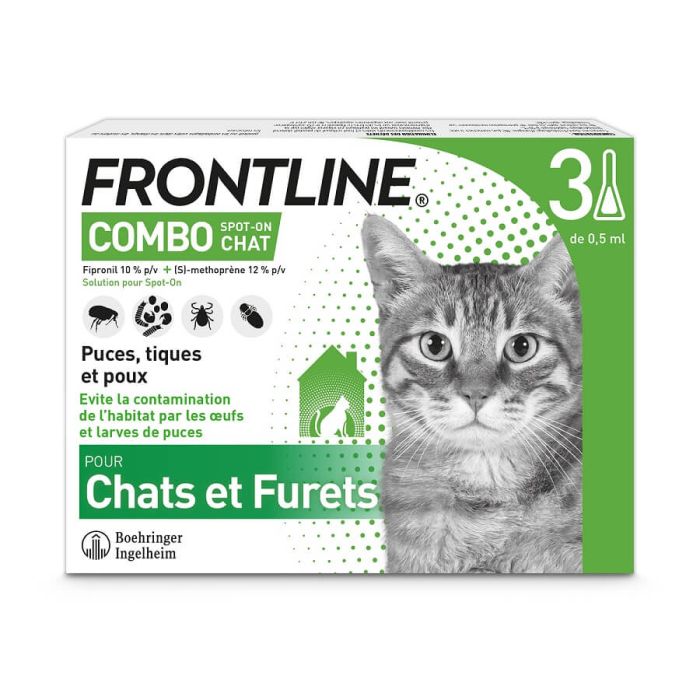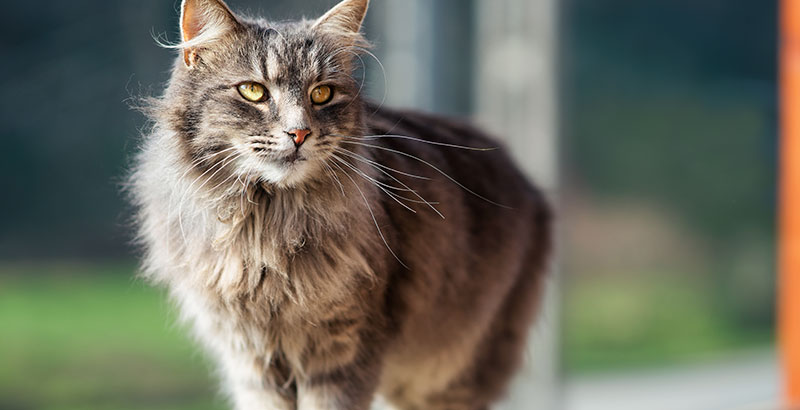-
Home
-
Frontline Combo Spot-on for Cats & Ferrets (3 pipettes)
Frontline Combo Spot-on for Cats & Ferrets (3 pipettes)
N’oubliez plus de protéger votre animal contre les puces et les tiques avec Pense-bête ANTIbébêtes
| Brand | Frontline |
| Manufacturer | Merial |
| Species | Cat |
| Prescription Type | POM-V (Written prescription required) |
Frontline Combo Spot-on Cat is an insecticidal and acaricidal solution for topical use, containing an association of an adulticidal active ingredient, fipronil, in combination with an ovicidal and larvicidal active ingredient, (S)-methoprene. Suitable for cats and ferrets.
Indications for use
In cats:
- To be used against infestations with fleas, alone or in association with ticks and/or biting lice.
- Elimination of fleas (Ctenocephalides spp.). Insecticidal efficacy against new infestations with adult fleas persists for 4 weeks. Prevention of the multiplication of fleas by inhibiting the development of eggs (ovicidal activity), larvae and pupae (larvicidal activity) originating from eggs laid by adult fleas for six weeks after application.
- Elimination of ticks (Ixodes ricinus, Dermacentor variabilis, Rhipicephalus sanguineus). The product has a persistent acaricidal efficacy for up to 2 weeks against ticks (based on experimental data).
- Elimination of biting lice (Felicola subrostratus).
The product can be used as part of a treatment strategy for the control of Flea Allergy Dermatitis (FAD).
In ferrets:
- To be used against infestations with fleas, alone or in association with ticks.
- Elimination of fleas (Ctenocephalides spp.). Insecticidal efficacy against new infestations with adult fleas persists for 4 weeks. Prevention of the multiplication of fleas by inhibiting the development of eggs (ovicidal activity), larvae and pupae (larvicidal activity) originating from eggs laid by adult fleas.
- Elimination of ticks (Ixodes ricinus). The product has a persistent acaricidal efficacy for 4 weeks against ticks (based on experimental data).
Prescription only medicine.
Frontline Combo Spot-on is only available with a prescription from your veterinary surgeon.
To check the most up to date information about this product, please read its Summary of Product Characteristics (SPC) below:
http://www.vmd.defra.gov.uk/ProductInformationDatabase/SPC_Documents/SPC_138119.DOCX
Fipronil is an insecticide and acaricide belonging to the phenylpyrazole family. It acts by interacting with ligand-gated chloride channels, in particular those gated by the neurotransmitter gamma-aminobutyric acid (GABA), thereby blocking pre- and post-synaptic transfer of chloride ions across cell membranes. This results in uncontrolled activity of the central nervous system and death of insects or acarines. Fipronil kills fleas within 24 hours and ticks (Dermacentor reticulatus, Dermacentor variabilis, Rhipicephalus sanguineus, Ixodes scapularis, Ixodes ricinus, Haemaphysalis longicornis, Haemaphysalis flava, Haemaphysalis campanulata) and lice within 48 hours post-exposure.
(S)-methoprene is an insect growth regulator (IGR) of the class of compounds known as juvenile hormone analogues that inhibit the development of immature stages of insects. This compound mimics the action of juvenile hormone and causes impaired development and death of the developing stages of fleas. The on-animal ovicidal activity of (S)-methoprene results from either direct penetration of the eggshell of newly laid eggs or from absorption through the cuticle of the adult fleas. (S)-methoprene is also effective in preventing flea larvae and pupae from developing, which prevents contamination of the environment of treated animals with the immature stages of fleas.
Active substances
Fipronil 50 mg
(S)-methoprene 60 mg
Excipient:
Butylhydroxyanisole (E320)
Butylhydroxytoluene (E321)
Ethanol
Polysorbate 80 (E433)
Polyvidone
Diethylene glycol monoethyl ether.
Frontline Combo is a prescription product and must be applied according to the instructions by your veterinary surgeon.
Please read the product leaflet thoroughly before applying to your pet.
Marketing Authorisation Holder
Merial Animal Health Limited
PO Box 327
Sandringham House
Harlow Business Park
Harlow
Essex
CM19 5TG
Marketing Authorisation Number
Vm 08327/4132
Contra-indications
- In the absence of available data, the product should not be used on kittens less than 8 weeks old and/or weighing less than 1 kg. The product should not be used on ferrets less than 6 months old.
- Do not use on sick (e.g. systemic diseases, fever) or convalescent animals.
- Do not use in rabbits, as adverse drug reactions, even mortality, could occur.
Special warnings for each target species
- Avoid contact with the animal’s eyes.
Special precautions for use in animals
- It is important to make sure that the product is applied to an area where the animal cannot lick it off and to make sure that animals do not lick each other following treatment. No data on the effect of bathing/shampooing on the efficacy of the product in cats and ferrets are available. However, based on information available for dogs shampooed from 2 days after application of the product, it is not recommended to bath animals within 2 days after application of the product.
- There may be an attachment of single ticks. For this reason transmission of infectious diseases cannot be completely excluded if conditions are unfavourable.
- Fleas from pets often infest the animal’s basket, bedding and regular resting areas such as carpets and soft furnishings which should be treated, in case of massive infestation and at the beginning of the control measures, with a suitable insecticide and vacuumed regularly.
- The potential toxicity of the product for kittens of less than 8 weeks of age in contact with a treated queen is not documented. Special care should be taken in this case.
Special precautions to be taken by the person administering the product to animals
- This product can cause mucous membrane, skin and eye irritation. Therefore, contact of the product with mouth, skin and eyes should be avoided. Animals or operators with a known hypersensitivity to insecticides or alcohol should avoid contact with the product.
- Avoid contents coming into contact with the fingers. If this occurs, wash hands with soap and water.
- After accidental ocular exposure the eye should be rinsed carefully with pure water. Wash hands after use.
- Treated animals should not be handled until the application site is dry, and children should not be allowed to play with treated animals until the application site is dry. It is therefore recommended that animals are not treated during the day, but should be treated during the early evening, and that recently treated animals are not allowed to sleep with owners, especially children.
- Do not smoke, drink or eat during application.
Adverse reactions
- Cats: Among the very rare suspected reactions, transient skin reactions at the application site (scaling, local hair loss, itching, redness) and general itching or hair loss have been reported after use. Excessive salivation, reversible nervous signs (increased sensitivity to stimulation, depression, other nervous signs) or vomiting have also been observed after use. If licking occurs, a brief period of excessive salivation may be observed due mainly to the nature of the carrier.
Use during pregnancy, lactation or lay
- The product can be used in cats during pregnancy and lactation.
- The safety of the product has not been established in ferrets during pregnancy and lactation. Use only according to the risk-benefit assessment by the responsible veterinarian.
Interactions
- None known.






